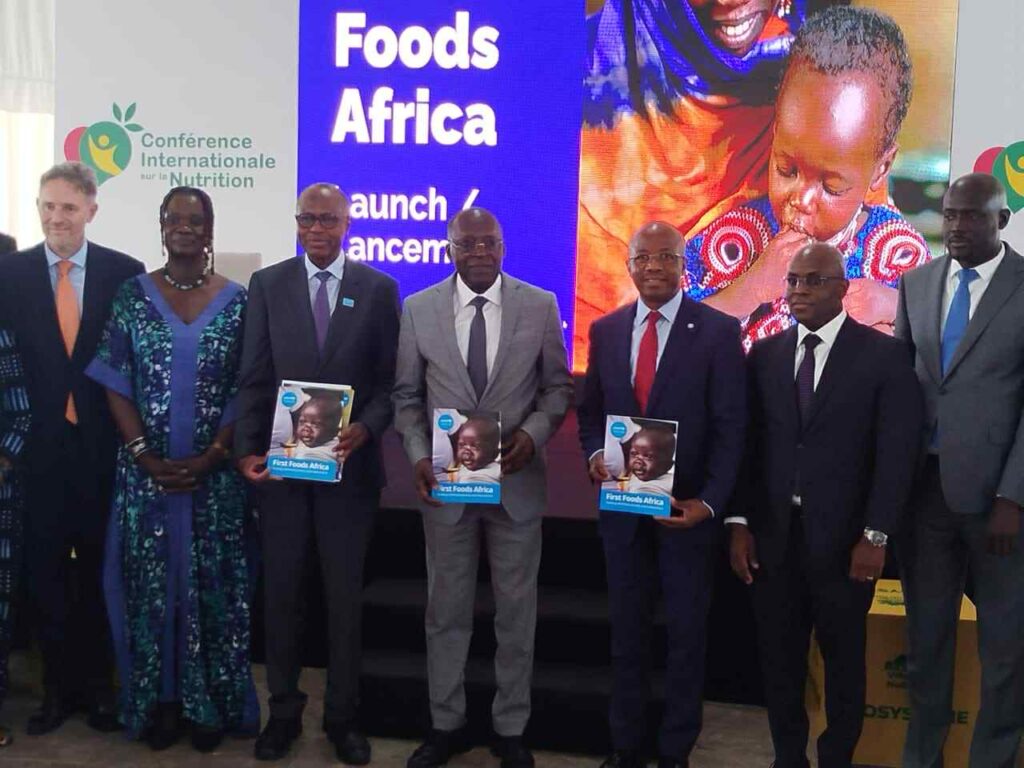UNICEF, AU Launch First Foods Africa in Cotonou to Tackle Child Food Poverty and Malnutrition

October 2, 2025
Cotonou, Benin: In a landmark event in Cotonou, UNICEF, in partnership with the African Union Commission (AUC) and the Government of Benin, officially launched the First Foods Africa Initiative. The initiative is a continental drive to address child food poverty and malnutrition through nutrition-sensitive food systems.
Speaking at the launch, Prof. Julio Rakotonirina, Director of Health and Humanitarian Affairs at the AUC, asserted that “nutrition is a right for every child, regardless of their geographic or economic background.” He described the initiative as “a decisive step towards eradicating child malnutrition and building resilient food systems across the continent.”
“With the launch of First Foods Africa, we affirm that good nutrition is a right. Hunger is preventable. The African Union Commission is working hand in hand with UNICEF, member states, regional bodies, and the private sector to amplify this initiative,” he added.
“It is our continental call, because investing in children’s first foods means we are investing in Africa’s first and greatest wealth and its people.”
Global and Regional Context
Globally, data shared by UNICEF show one in four children under age five, roughly 181 million, live in severe child food poverty. About one-third (some 57 million) of these children are in sub-Saharan Africa, where diets are severely limited and children miss essential nutrients required for healthy development. Severe child food poverty is a major driver of persistent undernutrition, including both stunting and wasting.
While many African countries have reduced stunting rates from 41.5 % in 2000 to about 32.3 %, population growth has meant that the total number of stunted children increased from 55.1 million to 62.3 million. Some 11.4 million African children suffer from wasting. Most sub-Saharan nations are not on track to meet the 2030 SDG nutrition targets.
Why Traditional Approaches Fall Short
Many existing food security initiatives focus on staple crops, increased yields, and household incomes. But they often neglect the specific nutritional needs of infants and young children. For children, dietary quality, diversity, nutrient density and safety are just as critical as quantity.
UNICEF defines child food poverty as the inability of children in early life to access and consume a sufficiently diverse, nutritious diet. To meet minimal dietary diversity for healthy growth, a child must eat from at least five out of eight food groups. Children receiving only three or four groups are in food poverty; those with two or fewer are in severe food poverty.
In sub-Saharan Africa, many children subsist on diets of just breastmilk (or milk) plus a staple cereal or tuber two food groups at most. That makes this region home to about one-third of the world’s children in severe food poverty.
The First Foods Africa Strategy
The initiative is anchored in the UNICEF Nutrition Strategy 2020–2030 and the UNICEF Vision on Food Systems for Children. It is a cornerstone of the UNICEF Africa Strategy, aligned with the AU’s Agenda 2063.
Its three strategic pillars are:
1. Incentivize local production of nutritious, safe, affordable, and sustainable first foods in Africa, by Africa, for children under five.
2. Strengthen policy environments to protect, promote, and support access to those foods for all children.
3. Stimulate consumption through large-scale social marketing, behaviour change programmes, and community engagement.
UNICEF says the programme will begin in 14 priority countries across the continent, spanning West, Central, East, and Southern Africa.
Implementation will rely on strong partnerships with governments, African food companies, and global institutions such as FAO, WFP, WHO, UNIDO, IFAD, UNCDF, and the World Bank.
To support these efforts, UNICEF is establishing the Child Nutrition Fund (CNF) a financial mechanism to channel investments, offer technical support, and de-risk private sector engagement aligned with UNICEF’s standards.
Voices from the Launch
At the launch, Omar Abdi, UNICEF Deputy Executive Director, called the moment “transformative.” He said: “This is a transformative moment for Africa’s children.”
From the Benin Government, the Minister of State in charge of Government Action Coordination, AbdoulayeBio Tchane noted: “Benin reaffirms its commitment today to champion child nutrition. According to him, child nutrition is essential to build a resilient continent”.
Other participants, including regional leaders, civil society actors, and private sector representatives, echoed support for reshaping food systems to meet children’s needs.
Impact and Outlook
If successful, First Foods Africa could dramatically reduce the prevalence of child food poverty and undernutrition across the continent. In its first phases, millions of children under five in the targeted countries are expected to gain improved access to nutritious foods, better policy protection, and healthier eating practices.
By addressing the systemic roots of malnutrition, UNICEF and its partners hope to ensure that no child is left behind and that Africa’s future lies in the health, growth, and potential of its youngest citizens



